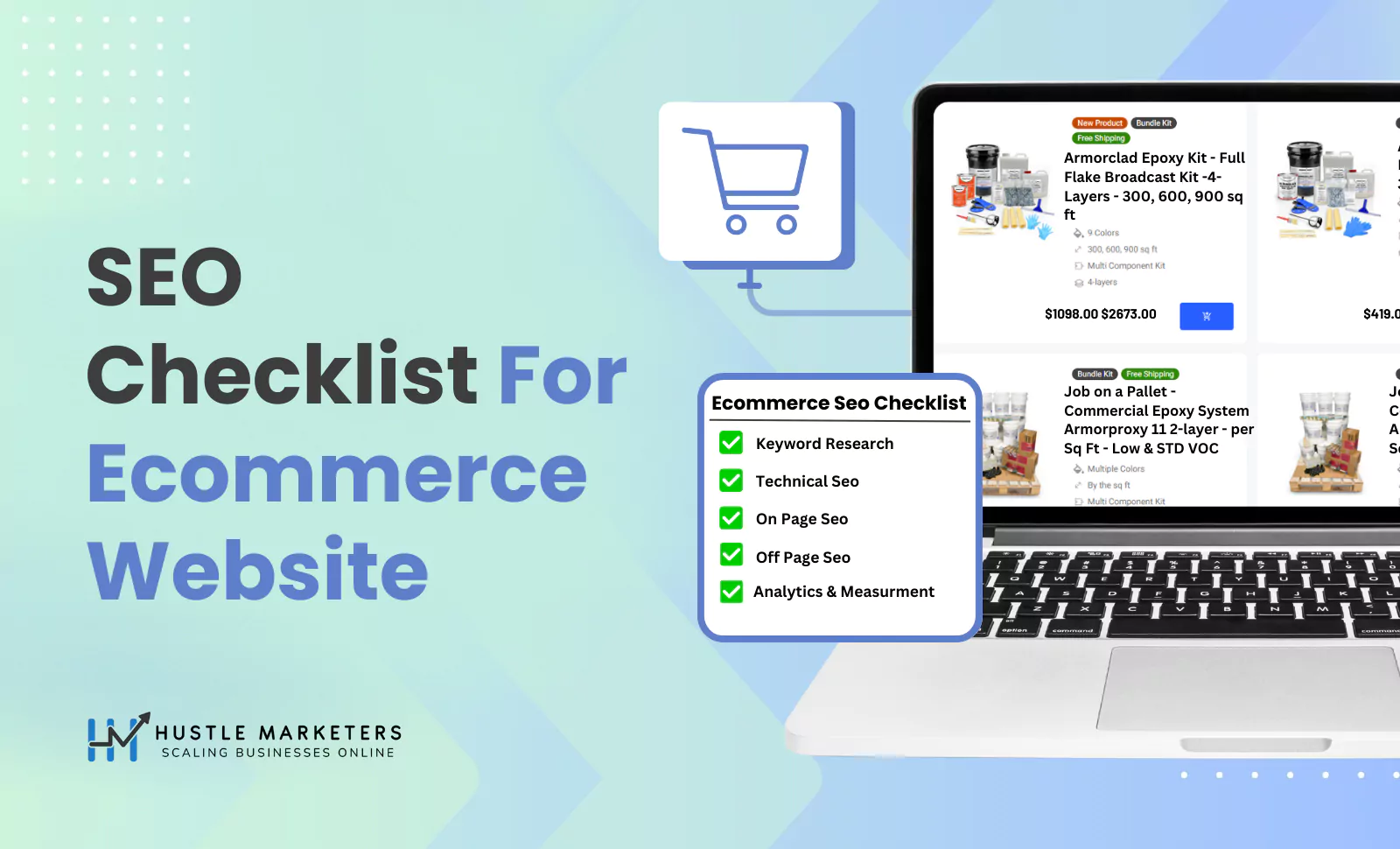Top 25 SEO Checklist For Ecommerce Website
Ishant
Published : February 3, 2023 at 12:42 pm
Ishant
Ishant Sharma is a Google Ads and Meta Ads specialist, SEO strategist, and paid media expert with over 10 years of experience in digital marketing. He’s passionate about search trends, performance marketing, and the evolving ad ecosystem. Known for his analytical mindset and creative edge, Ishant writes to simplify complex topics and stay ahead of digital shifts.

Follow this e-commerce SEO checklist with 20 best practices to increase ROI, drive organic traffic, and dominate the SERP rankings in 2025 and beyond.
There are over 28 million eCommerce sites globally. Yes, as staggering as this may sound, it’s true!
Every website has its own USP, and almost every brand has something unique to offer. Then why is it so that only a few lucky businesses score the top rank on SERPs, and the rest sink to the bottom pages? The answer lies in SEO (Search Engine Optimization).
SEO isn’t just about ranking high on Google; instead, it’s about creating an effortless shopping experience that keeps customers engaged and coming back for more. However, search engine algorithms are as dynamic as they can be, and in fact, Google launched seven algorithm updates in 2024 alone, with the March 2024 core update being the biggest update ever. So, where do you start, and how do you make your website rank? That’s where our eCommerce SEO checklist comes in handy.
Why Do You Need an eCommerce SEO Checklist?
Running an online store without an SEO checklist means inviting losses with arms wide open. You will waste time, miss opportunities, nd probably end up lost. With thousands (or even millions) of eCommerce websites competing for attention, simply having great products isn’t enough. You need to make sure your store is search engine-friendly, fast, mobile-optimized, and easy to navigate, and that’s where an eCommerce SEO guide comes in because it helps you to ensure that you don’t miss anything.
From keyword research and product page optimization to site speed and mobile responsiveness, an SEO checklist keeps you on track and ensures that every crucial detail is covered. It’s a proactive approach in eCommerce marketing that helps you stay ahead of Google’s algorithm updates and your competitors.
Best Practices for eCommerce SEO Checklist
To help you get started, I have compiled a step-by-step guide covering everything from keyword research and on-page SEO for ecommerce to backlink building strategies and more. Whether you are launching a new store or refining an existing one, these SEO tactics will help you increase website visibility, drive organic traffic, and take your online brand to new heights of success.
1. Nail Your Keyword Research
The first thing you need to focus on is keyword research for eCommerce. Google considers your keywords as the map that leads customers to your products. If you are only targeting broad terms like “running shoes,” you will end up competing with industry giants like Nike.
Instead, you can become strategic and specific with keywords like “lightweight trail running shoes for women.” To make your keyword research more targeted, you can use tools like Google Keyword Planner or Ahrefs, and the more precise your keywords are, the better chances you have of ranking higher and attracting the right shoppers.
Also, while you are at it, don’t forget to include keywords based on user intent, as these will be the ones that will bring visitors with buyer intent to your site.
2. Optimize Titles, Descriptions, and Meta Tags
Did you ever scroll past a product because the title was too vague? Well, you aren’t alone. Many people do that.
In fact, let me tell you something very interesting: the average attention span of a human is considered to be around 5 seconds, while a goldfish is said to have a slightly longer attention span at around 9 seconds! Now, when your target audience flicks to your competitor’s website within a few seconds, the question is: how do you retain them?
Simple: the answer is with catchy and simple product titles and keywords. As per our eCommerce SEO checklist, your product title and description must be crystal clear and packed with keywords. Instead of “Stylish Sneakers,” you can try “Breathable White Sneakers for Women- Lightweight & Comfortable.” Besides, your meta descriptions should also be enticing because they are like mini ads in search results, which give shoppers a reason to click.
3. Keep URLs Short and Sweet
Your URL or Uniform Resource Locator is the text that appears in the address bar of your eb browser, and when a customer approaches your website, the URL is the first thing they are going to see. Long, messy URLs are a nightmare for both search engines and customers. If you are creating an SEO checklist for eCommerce websites, take a moment and tell us, which one looks better?
- www.mystore.com/p=1234-category?=shoes
- www.mystore.com/women-white-sneakers
The latter one, right? Having a clean, keyword-rich URL can tell Google exactly what your page is about, and this makes it easier for customers to remember the URL.
4. Speed Up Your Website
Nobody likes a slow website. So, if your pages take forever to load, shoppers will bounce before they even see your products. This is why you also need to focus on site speed optimization. Compress images, enable browser caching, and use a CDN (Content Delivery Network) to speed things up. It will be like making sure your online store’s checkout line moves fast without anyone having to wait for their purchase.
Need more information on how to make your website lightning-fast? Here’s a guide to help you get started.
5. Make Your Site Mobile-Friendly
There’s no way you can miss mobile optimization in your SEO checklist for eCommerce websites. Mobile generates 58% of all Google searches, and around 56% of shoppers use their smartphones to research products while shopping in-store. So, if your online store isn’t optimized for mobile devices, you are doomed to lose customers.
For example, think how your customers would feel when they try shopping on your site where they had to zoom in and scroll sideways. Frustrating, right? This is why you need to focus on mobile SEO for eCommerce and test your site on different devices to ensure buttons, images, and text are easy to tap and read. Unsure how to get started? Here’s how the industry giants like Nike and LV are doing it:
6. Add Schema Markup for Rich Snippets
Schema markup for eCommerce sites is indispensable because schemas are one-stop resources for webmasters that aid search engines in understanding a website better. If you have an eCommerce website, a schema highlights all the customer-centric information like product ratings, prices, and stock availability directly in Google search results.
When you add structured data, it helps search engines display more info about your products, hence increasing your chances of getting clicks. For example, if you sell coffee makers, a rich snippet showing “4.8 stars | $99 | In Stock” can make your product stand out from its competitors.
7. Write Unique Product Descriptions
When you are doing your content marketing for eCommerce, don’t just copy and paste manufacturer descriptions because Google hates duplicate content. Rather, highlight your product’s unique selling points more engagingly.
Suppose you sell organic face creams. To market the product, don’t just list ingredients; try describing how it soothes dry skin, absorbs quickly, and smells amazing. One of the best eCommerce SEO best practices is telling a story that makes people want to buy, and if you are not using it, you are clearly at a sign of loss.
8. Optimize Category Pages
For those who have an online store, their category pages are like the aisles of a brick-and-mortar shop. Thus, you need to ensure that they are easy to navigate and are packed with relevant keywords, just like this luxury brand did it.
Make your category pages more relevant and easy to understand. For example, if you have just “T-shirts” as your category pages, try using “Men’s cotton t-shirts.” In addition, you can also add internal links to related products or subcategories to help customers (and Google) find what they need faster.
9. Make Navigation Simple
I have said it once, and I will say it again- Google is obsessed with sites that devote their time to simplifying user experience design for eCommerce. So, unless you want your customers confused, try making your cluttered website more user-friendly.
Your main menu should be clear, organized, and easy to understand. Enriching user experience is one of the simplest eCommerce SEO best practices because it helps users to see your website as a well-laid-out store: they don’t have to dig through endless sections to find what they need.
I will recommend you stick to intuitive interfaces and categories and avoid overwhelming or overcomplicated options if your goal is to sell more products through your online store.
10. Use Breadcrumbs
Breadcrumbs (like “Home > Women’s Shoes > Sneakers”) make navigation easier for both users and search engines. They help customers quickly backtrack to a previous page and improve SEO as they also strengthen interlinking.
You can include breadcrumbs in your SEO strategies for online stores because they are more like leaving a digital trail of breadcrumbs that guide both Google and shoppers to the right place without any hurdles.
11. Optimize Images
When you have an online store, your customers can’t touch or feel the products like they can in real life. This is why image SEO for product listings matters. Large, unoptimized images can slow down your site, and they are bad for SEO as well as user experience.
To ensure that your product images are easy to load, always compress images before uploading and use descriptive alt text like “black leather backpack for travel” instead of “IMG_1234.” By doing so, you can help Google understand what the image is about, and this improves your chances of showing up in image search results.
12. Submit an XML Sitemap
You can think of an XML sitemap as a way for search engines to tell where all your important pages are. Including it in your SEO strategies for online stores is important because a sitemap makes it easier for SERPs to crawl and index your site. You can reach out to professionals for this or generate one using Yoast SEO (for WordPress) or Google Search Console because if Google can’t find your pages, they won’t rank.
13. Fix Broken Links and 404 Errors
Nothing frustrates shoppers more than clicking on a product only to land on a “Page Not Found” error. Broken links massively hurt SEO and send customers running. To fix broken links and 404 errors, use tools like Google Search Console or Screamling Frog and follow it with technical SEO for online stores. Some possible technical SEO concerns include:
- Duplicate content
- Canonicalization issues
- Indexing errors
- Slow page speed
- Mobile usability
- Broken links
- Thin content
- Poor internal linking
- Improper redirects
- Faceted navigation
- JavaScript rendering
- URL structure issues
- Schema Markup Errors
- Crawl budget waste
- Orphan pages
- Large image files
- Server response time
- HTTPS implementation
- XML sitemap issues
- Robots.txt misconfiguration
We have already discussed some of these issues in our eCommerce SEO guide, and for others, you need to reach out to professionals for a thorough eCommerce SEO audit. They can help you identify the technical SEO flaws and address them immediately, so they don’t hurt your search engine rankings.
14. Secure Your Website (HTTPS)
As per research by SecurityMetrics, a significant majority of over 92% of analyzed eCommerce sites showed signs of malicious, suspicious, or concerning security issues. Customers enter their sensitive personal information and financial details on your online store, and the last thing they want is for their data to be compromised.
Security doesn’t just matter for SEO, it’s also crucial for building customer trust. Google prefers HTTPS websites because they protect user data. If your site still uses HTTP, browsers might warn visitors that it’s “Not Secure.” That’s a major red flag! Get an SSL certificate and keep your customers (and rankings) safe.
15. Get More Customer Reviews
Reviews on an eCommerce site aren’t just for credibility; they also help to improve your SEO. Google loves fresh, user-generated content. So, try encouraging happy customers to leave reviews on your product pages, and don’t be afraid to respond back. For example, if you have a product with 100+ positive reviews, it is far more likely to rank and convert than one with none.
16. Use Canonical Tags
If you sell the same product in different colors or sizes, Google might see these as duplicate pages. This is where product page optimization with canonical tags comes in. They tell search engines which version of the page is the main one. In a nutshell, without canonical tags, your SEO would take a hit from duplicate content issues.
If you want your products to be displayed on Google, here’s a comprehensive blog on eCommerce PPC that can help you master Google Shopping.
17. Optimize for Voice Search
With more people using voice search assistant tools like Siri, Alexa, and Google Assistant, you also need to focus on voice search. Instead of just targeting short keywords, try optimizing your site for natural, conversational phrases like “Where can I buy waterproof hiking boots near me?”
BONUS TIP: When you use long-tail keywords, they can also help local SEO for online stores because local SEO also helps with ranking your store better for local searches. If you have a physical store or offer local delivery, local SEO is a game-changer.
Optimize your Google Business Profile, include local keywords like “best handmade candles in Chicago”, and get listed in local directories. Customers searching for products “near me” should find your store before your competitors!
18. Build High-Quality Backlinks
Just because you have an online store doesn’t mean you should neglect off-page SEO techniques. A backlink from Forbes or a major industry site is way more valuable than one from a random directory. Build links through guest posts, partnerships, PR outreach, and influencer collaborations because the more high-quality sites link to you, the more Google trusts your store.
19. Implement Pagination Correctly
If you have hundreds of products, a “Load More” button or infinite scrolling might seem tempting. But without proper SEO setup, search engines struggle to crawl your pages. Use rel=“next” and rel=“prev” tags for pagination and ensure that Google can index all products, not just the first batch.
20. Optimize Product Detail Pages (PDPs)
A PDP or a Product Detail Page is the page on an eCommerce site where a shopper finds all the important details about a product. These are the pages where your shoppers decide whether to buy or bounce, this is why you need to optimize these pages and include:
- Product name
- High-quality images and videos
- Price and Discounts
- Detailed descriptions
- Customer reviews and ratings
- Call-to-action (CTA) buttons
A great PDP answers all potential customer questions and makes it easy for them to trust and buy the product because it is your digital store shelf. So, optimize it tactfully and I bet it would help your conversions as well as overall site rankings.
21. Track Performance with Google Analytics and Search Console
The last but most important step in my eCommerce SEO guide is analytics for eCommerce websites. You can’t improve what you don’t measure! Google Analytics helps track traffic, conversions, and user behavior, while Search Console alerts you to indexing issues and keyword rankings. If certain pages aren’t performing well, tweak your SEO strategy based on real data, not guesswork.
Wondering how to track and measure the success of your eCommerce digital marketing strategy? Here’s a comprehensive blog on eCommerce KPIs to help you get started.
22. Use the Right Ecommerce SEO Tool
Managing SEO for an eCommerce store can feel like handling too much with too little time. You have to track the keywords, product pages, backlinks, site speed, mobile usability, schema… and the list goes on. However, you don’t have to do it all on your own, if you have the right eCommerce SEO tool.
Whether it’s Ahrefs, SEMrush, Screaming Frog, or even Shopify’s built-in SEO helpers, you need to leverage technology to cut down the manual burnout. These tools help you spy on your competitors, find juicy keywords, fix broken links, optimize meta tags, and monitor how your product pages are performing in real time. The best part here is, that these tools help you work smarter, not harder. So, instead of guessing what Google wants, you will have the data to guide your every move.
Pro Tip: Don’t just use one tool and call it a day. Instead, stack them up based on your needs. For example, you can use:
- One for auditing
- One for tracking,
- One for Content ideas
- And so on.
Trust me, your eCommerce SEO game will thank you because it will be like having a map in a digital jungle.
23. Solidify Your Social Media Presence
Brands like Sephora, Amazon, and even leading brands like H&M and Zara are on social media. So, if you aren’t using the full potential of your social media platforms, you are missing out on customers and revenue.
Social platforms aren’t just meant for memes and cute cat videos, they are powerful discovery engines, where your future customers are already hanging out. Whether it’s Instagram, TikTok, Pinterest, or even LinkedIn, being present and active on these platforms improves your brand’s visibility and can indirectly power up your SEO.
The more people talk about and share your products, the more traffic you drive to your site, and search engines LOVE that. Social signals like shares, likes, and clicks that might not directly impact rankings, but they sure send a strong message that your content matters. Plus, social profiles themselves often rank on Google, giving your brand extra shelf space on the SERP. So, post consistently, engage with your audience like a human (not a robot), and don’t be afraid to show off your products in creative ways.
24. Enable Product Reviews with Structured Data
Let your customers do the talking. You can enable reviews, and this doesn’t just build trust, but it also adds golden stars to your search listings with rich snippets because of structured data. This boosts click-through rates and tells Google your page is engaging and relevant. Just ensure your review system is crawlable and uses proper schema markup, so those star ratings shine right on the SERPs.
25. Add FAQ Sections to Key Pages
You know those little questions that pop into people’s heads before they hit “buy”? Answer them right on your product or category pages with a well-thought-out FAQ section. It keeps users on your site longer and gives you another opportunity to target voice and long-tail keywords. Bonus points if you mark it up with FAQ schema, it could also earn you a featured snippet in Google.
Final Thoughts on Our E-Commerce SEO Checklist
And there you have it- 20 must-follow SEO tips for 2025! Fine-tune your eCommerce SEO checklist with these industry best practices, rank higher, and stay ahead of the game. For more tips, feel free to explore our blog on “Actionable tips to optimize your eCommerce store.”
However, you don’t need to do it alone. You can also reach out to professionals for eCommerce SEO services, and they can handle the heavy lifting for you. Need more information or looking for seasoned marketers who can help your online store get more visibility? Get in touch with our experts at Hustle Marketers today. We would be more than happy to help!












